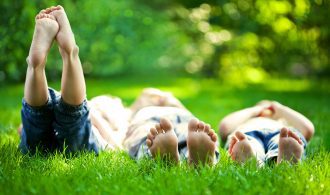By Marco Torres
Guest writer for Wake Up World
Research proves there are many positive effects of contact with nature on children and their overall well-being. Nature can be attributed to higher levels of creativity, better cognitive skills, lower obesity rates and a whole host of other beneficial reasons doctors are actually prescribing “time in nature” to their patients.
In addition, recent studies indicate it isn’t only nature that has this kind of effect, letting children have free play time away from structured programs has a big impact on their overall health — due to the effect of what educators call ‘executive function’.
Executive function is a broad educational term used for many cognitive skills including organization, task initiation and the ability to switch between activities. Children who have poor executive functioning (including many diagnosed with ADHD) are more disorganized than other kids. They might take an extraordinarily long time to get dressed or become overwhelmed while doing simple chores around the house. Schoolwork can become a nightmare too, because they regularly lose papers or start week-long assignments the night before they are due.
According to a new study by psychologists at the University of Colorado, having free time to play has a direct and positive effect on executive functioning. Having positive executive functioning is an important predictor of school readiness, academic performance and positive life outcomes, including earning capacity and good health.
Unscheduled, Unsupervised Playtime is Key
Our fearful society has locked down most of what older generations used to take for granted, especially unscheduled and unsupervised playtime, just the thought of which, these days, gives the average mom a mild heart attack. Yet, children who have more time in free play, spontaneous activities, self-selected reading and more time in the natural world are found to have more highly developed executive function.
According to Jessica Lahey, educator, speaker, and author of the book “The Gift of Failure: How the Best Parents Learn to Let Go So Their Children Can Succeed”:
“Unscheduled, unsupervised play time is one of the most valuable educational opportunities we give our children.”
In 2015, Peter Grey, a Boston College psychology professor who studies the benefits of free play in human development, published the book “Free to Learn: Why Unleashing the Instinct to Play Will Make Our children Happier, More Self-Reliant, and Better Students for Life”. He states:
“Free play is nature’s means of teaching children that they are not helpless. In play, away from adults, children do have control and can practice asserting it. In free play, children learn to make their own decisions, solve their own problems, create and abide by rules, and get along with others as equals rather than as obedient or rebellious subordinates.”
So what’s the solution?
It’s time we give children the freedom to think and experience ‘outside the box’. Their perspectives and preferences show us that what young people ‘think’ is not necessarily what their parents ‘think they think’. So, children need a voice. Parents tend to underestimate their own influence, but are also prone to take insufficient account of children’s feelings at times of emotional stress which, often, comes from being forced into increasingly more structure, assessment etc.
Policy-makers and commentators often blame ‘bad parenting’ for children’s and young people’s troublesome behaviour, but flexible adaptable parenting is more likely to be effective than a ‘one size fits all’ approach that comes with policy and structure. Kids are not robots — they are unique. If we want them to flourish, we must give them the space to be children, in the way that only they know how.
For more, check out these articles:
- Raising Awake Children in a Broken School System
- Why Education Must Come Back to Nature
- Self Discovery – The Key to Real Education
- A New Education Model for Humanity
- Grassroots Revolution Towards a Holistic and Creative Educational System
Recommended articles by Marco Torres:
- Hemp Can Free Us From Oil, Prevent Deforestation and Cure Cancer – So Why Is It Illegal?
- The Endocannabinoid System and How THC Cures Cancer
- Cannabis Treats Anxiety, Depression and Activates Brain Pathways That Regulate Emotional Behavior
- Study Shows The Therapeutic Effects of Marijuana on Autistic Children
- Cannabis Oil Cures Infant of Cancer, Dissolves Inoperable Tumor
- 5 Diseases Proven To Respond Better To Cannabis Than Prescription Drugs
- Another Reason Marijuana is Illegal: It Prevents the Spread of HIV
- 4 Diseases That Can Be Reversed Naturally Without Pharmaceutical Drugs
- 5 Reasons to Juice Rather Than Smoke Cannabis
- Woman Shrinks Inoperable Mass, Heals Her Thyroid Disease With Cannabis Oil
- The Top 15 Lies You’re Being Told About Health and Mainstream Medicine
- Still Believe Nature Got It Wrong? Top 10 Health Benefits of Marijuana
- Cannabis Infused Coffee – Consumers Grow Wise to Health Benefits of Marijuana
About the author:
Marco Torres is a research specialist, writer and consumer advocate for healthy lifestyles. He holds degrees in Public Health and Environmental Science and is a professional speaker on topics such as disease prevention, environmental toxins and health policy.
This article re-posted with permission from Prevent Disease.

If you've ever found value in our articles, we'd greatly appreciate your support by purchasing Mindful Meditation Techniques for Kids - A Practical Guide for Adults to Empower Kids with the Gift of Inner Peace and Resilience for Life.
In the spirit of mindfulness, we encourage you to choose the paperback version. Delve into its pages away from screen glare and notifications, allowing yourself to fully immerse in the transformative practices within. The physical book enriches the learning process and serves as a tangible commitment to mindfulness, easily shared among family and friends.
Over the past few years, Wake Up World has faced significant online censorship, impacting our financial ability to stay online. Instead of soliciting donations, we're exploring win-win solutions with our readers to remain financially viable. Moving into book publishing, we hope to secure ongoing funds to continue our mission. With over 8,500 articles published in the past 13 years, we are committed to keeping our content free and accessible to everyone, without resorting to a paywall.








